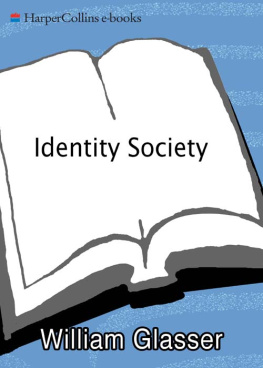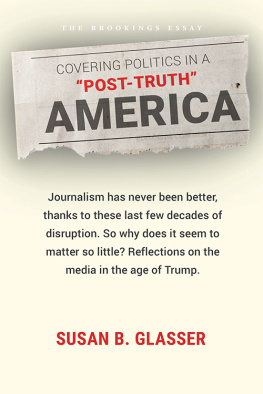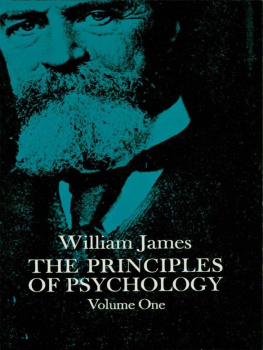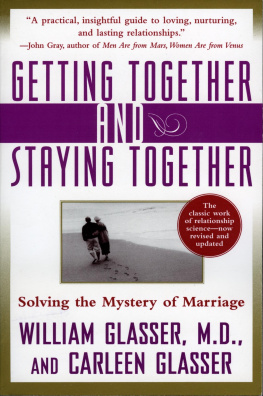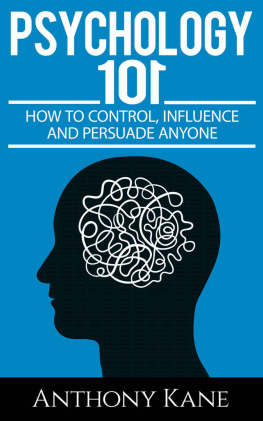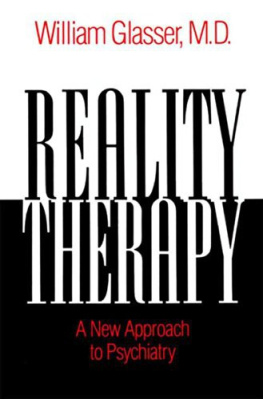C H O I C E
T H E O R Y

William Glasser, M.D.

To my wife, Carleen
This book is as much hers as mine. I wrote it, and she gave input to every page, literally to every word. I love her very much and wish I had the words to describe our marriage. But in Far from the Madding Crowd, Thomas Hardy had the words, and I quote to describe what we have together:
This good fellowshipcamaraderieusually occurring through the similarity of pursuits is unfortunately seldom super-added to love between the sexes, because men and women associate, not in their labours but in their pleasures merely. Where, however, happy circumstances permit its development, the compounded feeling proves itself to be the only love which is strong as deaththat love which many waters cannot quench, nor the floods drown, besides which the passion usually called by the name is as evanescent as steam.
CONTENTS
T HIS BOOK IS ABOUT how important good relationships are to a successful life. In it I state that, if we are not sick, poverty stricken, or suffering the ravages of old age, the major human problems we struggle withviolence, crime, child abuse, spousal abuse, alcohol and drug addiction, the proliferation of premature and unloving sex and emotional distressare caused by unsatisfying relationships. This whole book is both an explanation of why this happens and what to do to get along better with one another.
I focus on four major relationships, all of which are in obvious need of improvement. These are husband-wife, parent-child, teacher-student, and manager-worker. I make the claim that if we do not improve these relationships, we will have little success in reducing any of the problems in the previous paragraph.
For me to make such a broad claim may be considered presumptuous but, just before this book went to press, I was pleased to find recent research that strongly supports my thesis that adolescents, especially, need good parent-child and teacher-student relationships if they are to avoid self-destructive behaviors.
The September 10, 1997, issue of the Journal of the American Medical Association (JAMA)includes an article entitled Protecting Adolescents from Harm, which describes the first findings from the National Longitudinal Study on Adolescent Health. The most significant finding was: Parent-family connectedness and perceived school connectedness were protective of every health risk behavior measure except history of pregnancy.
The research does not as yet go into how to improve these two important relationships, but it does show clearly that this is the direction in which to goand that is the subject of this book. I would suggest that the researchers also focus on how husbands and wives can achieve more marital satisfaction, which I think is a vital factor in achieving child-parent connectedness. Years ago, a priest I knew in Chicago, by the name of Father John, said something I have never forgotten: The best thing parents can do for their children is love each other.
As you read this book you will note that I do not use the word connectedness. Although I use satisfying relationships, I can see no difference in the terms. I encourage you to read the JAMAarticle if you want to see for yourself how strongly it supports what I say in this book.
S UPPOSE YOU COULD ask all the people in the world who are not hungry, sick, or poor, people who seem to have a lot to live for, to give you an honest answer to the question, How are you? Millions would say, Im miserable. If asked why, almost all of them would blame someone else for their miserylovers, wives, husbands, exes, children, parents, teachers, students, or people they work with. There is hardly a person alive who hasnt been heard saying, Youre driving me crazy. That really upsets me. Dont you have any consideration for how I feel? You make me so mad, I cant see straight. It never crosses their minds that they are choosing the misery they are complaining about.
Choice theory explains that, for all practical purposes, we choose everything we do, including the misery we feel. Other people can neither make us miserable nor make us happy. All we can get from them or give to them is information. But by itself, information cannot make us do or feel anything. It goes into our brains, where we process it and then decide what to do. As I explain in great detail in this book, we choose all our actions and thoughts and, indirectly, almost all our feelings and much of our physiology. As bad as you may feel, much of what goes on in your body when you are in pain or sick is the indirect result of the actions and thoughts you choose or have chosen every day of your life.
I also show how and why we make these painful, even crazy, choices and how we can make better ones. Choice theory teaches that we are much more in control of our lives than we realize. Unfortunately, much of that control is not effective. For example, you choose to feel upset with your child, then you choose to yell and threaten, and things get worse, not better. Taking more effective control means making better choices as you relate to your children and everyone else. You can learn through choice theory how people actually function: how we combine what is written in our genes with what we learn as we live our lives.
The best way to learn choice theory is to focus on why we choose the common miseries that we believe just happen to us. When we are depressed, we believe that we have no control over our suffering, that we are victims of an imbalance in our neurochemistry and hence that we need brain drugs, such as Prozac, to get our chemistry back into balance. Little of this belief is true. We have a lot of control over our suffering. We are rarely the victims of what happened to us in the past, and, as will be explained in chapter 4, our brain chemistry is normal for what we are choosing to do. Brain drugs may make us feel better, but they do not solve the problems that led us to choose to feel miserable.
The seeds of almost all our unhappiness are planted early in our lives when we begin to encounter people who have discovered not only what is right for thembut also, unfortunately, what is right for us. Armed with this discovery and following a destructive tradition that has dominated our thinking for thousands of years, these people feel obligated to try to force us to do what they know is right. Our choice of how we resist that force is, by far, the greatest source of human misery. Choice theory challenges this ancient I-know-whats-right-for-you tradition. This entire book is an attempt to answer the all-important question that almost all of us continually ask ourselves when we are unhappy: How can I figure out how to be free to live my life the way I want to live it and still get along well with the people I need?
From the perspective of forty years of psychiatric practice, it has become apparent to me that all unhappy people have the same problem: They are unable to get along well with the people they want to get along well with. I have had many counseling successes, but I keep hearing my mentor, Dr. G. L. Harrington, the most skillful psychiatrist Ive ever known, saying, If all the professionals in our field suddenly disappeared, the world would hardly note their absence. He was not disparaging what we do. He was saying that if the goal of psychiatrists is to reduce the misery rampant in the world and to help human beings get along with each other, their efforts have hardly scratched the surface.
Next page

